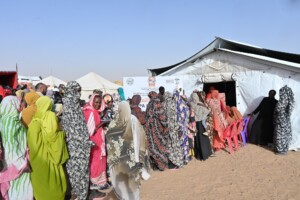DRA Agriculture Minister predicts food shortage in Darfur
The Minister of Agriculture of the Darfur Regional Authority (DRA) has expressed concern about a food shortage in the region as a result of the delayed and sparse rainfall this year.
DRA Minister El Sadig Yousef Zakaria told Radio Dabanga on Tuesday that North and West Darfur are affected most. “The farms in South, Central, and East Darfur certainly needed more rain, but the situation is not too bad.”
He added that farmers in all five Darfur states need protection from herders’ attacks, and lauded the South Darfur government for forming a committee to protect the farms in the state.
The Minister of Agriculture of the Darfur Regional Authority (DRA) has expressed concern about a food shortage in the region as a result of the delayed and sparse rainfall this year.
DRA Minister El Sadig Yousef Zakaria told Radio Dabanga on Tuesday that North and West Darfur are affected most. “The farms in South, Central, and East Darfur certainly needed more rain, but the situation is not too bad.”
He added that farmers in all five Darfur states need protection from herders’ attacks, and lauded the South Darfur government for forming a committee to protect the farms in the state.
Zakaria acknowledged “the neglect of several agricultural projects in Darfur”. The DRA has conducted a study and a survey of the situation in Jebel Marra, Habila, Abu Hamra, and Ghazala Jawazat.
“A number of projects have been selected that will be submitted for funding by international donors during a DRA conference to be held in Khartoum later this month,” he said.
‘Poor preparations’
In August, Mohamed Mukhtar El Khateeb, political secretary of the Communist Party of Sudan, predicted a food shortage in the coming season, because of the late start of the rainy season, and poor preparation of irrigation projects.
“The delayed rains and poor preparations, the lack of diesel, and the neglect of water canal maintenance will lead to shortages in key crops such as sesame, sunflower, and ground nuts,” he told Radio Dabanga.
“We need to prevent clashes between nomads and farmers to secure the harvest season,” he said.
‘Crop failures’
The UN Food and Agriculture Organization (FAO) said in a press statement on 29 September that the below-average rainfall in Sudan has resulted in delayed planting, poor crop growth and pasture conditions in many regions.
There is an increased risk of crop failures and low production surpluses anticipated for the 2015/2016 harvest period, FAO concluded in an assessment of crop performance and growth and livestock health in Sudan’s key rain-fed agricultural areas.
Darfur, and West and South Kordofan are among the areas most at risk.
FAO announced that it seeks $6 million to enhance the resilience of 125,000 extremely vulnerable farming and herding families (750,000 people) “affected by the country’s drought-like conditions”.
The $6 million the UN agency hopes to raise will provide families with vegetable and legume seeds, tools, planting support, livestock fodder, and vaccination services to enable families to grow more food during the winter farming season, which runs from November to March.











 and then
and then